Trending Now
We have updated our Privacy Policy and Terms of Use for Eurasia Group and its affiliates, including GZERO Media, to clarify the types of data we collect, how we collect it, how we use data and with whom we share data. By using our website you consent to our Terms and Conditions and Privacy Policy, including the transfer of your personal data to the United States from your country of residence, and our use of cookies described in our Cookie Policy.
Trump's health agenda—from RFK Jr. to leaving WHO
From RFK Jr.’s nomination to lead the health department to an executive order withdrawing the US from the World Health Organization, President Trump has already made sweeping changes to public health policy, and this may be just the beginning. On GZERO World, New York Times Science and Global Health Reporter Apoorva Mandavilli joins Ian Bremmer for an in-depth look at health and medicine in the second Trump administration—and what it could mean, not just for the US, but for the rest of the world. With bird flu numbers rising in the US and a noted vaccine skeptic poised to become the country's most powerful public health official, should we be worried about potential new pandemics or cuts at the CDC and NIH? Will the FDA endorse RFK’s ideas about raw milk and unfluoridated water? RFK gets a lot right about the need to focus on disease prevention and remove toxins fom our food and environment, but many of his ideas are at odds with mainstream medical science, posing a risk to public health. Bremmer and Mandavilli break down the big stories in healthcare right now, and what the future of the US medical establishment could look like.
"We have a huge problem with trust in this country, and that predates RFK Jr.," Mandavilli says, "Now when you have somebody who has made those comments very openly about the CDC not being trustworthy or the FDA not being trustworthy, and that's who's leading the health department, I think we are in real danger of people [not trusting] anything."
GZERO World with Ian Bremmer, the award-winning weekly global affairs series, airs nationwide on US public television stations (check local listings).
New digital episodes of GZERO World are released every Monday on YouTube. Don't miss an episode: subscribe to GZERO's YouTube channel and turn on notifications (🔔).
- Ian Bremmer: American democracy at risk thanks to conspiracy theories ›
- The Disinformation Election: Will the wildfire of ... - GZERO Media ›
- Trump’s rockiest Cabinet picks get spicy hearings ›
- What would it mean for the US to leave the World Health Organization? ›
- What can RFK Jr. do for Donald Trump? ›
- Senate hearings: Gabbard and RFK Jr. make it out of committee ›
- Senate grills RFK Jr. on healthcare policy and vaccine statements ›
- Should we worry about bird flu in the US? - GZERO Media ›
Latest Episodes
Europe's new future with Trump 2.0
As Donald Trump returns to the White House, European leaders are reassessing their reliance on the United States for security and economic stability. In a wide-ranging conversation on GZERO World, Ian Bremmer sits with Finnish President Alexander Stubb on the sidelines of the World Economic Forum in Davos. They discuss the evolving role of Europe in an era of shifting alliances, economic uncertainty, and rising geopolitical risks. In other words, Europe's role in a Trump 2.0 era. Stubb expresses cautious optimism about Trump’s approach to Russia and Ukraine but underscores the need for Europe to take greater responsibility for its defense and technological leadership.
Stubb also acknowledges that Europe is facing a moment of reckoning. Leaders like Emmanuel Macron and NATO Secretary General Mark Rutte calling for increased defense spending and reduced reliance on U.S. security guarantees. Stubb agrees that Europe must strengthen its strategic position but remains wary of the region’s economic competitiveness, particularly in technology, where the US holds a clear advantage.
GZERO World with Ian Bremmer, the award-winning weekly global affairs series, airs nationwide on US public television stations (check local listings).
New digital episodes of GZERO World are released every Monday on YouTube. Don't miss an episode: subscribe to GZERO's YouTube channel and turn on notifications (🔔).
Francis Fukuyama on the new leaderless global order
In a wide-ranging conversation on GZERO World with Ian Bremmer, Francis Fukuyama warns that the United States is losing its ability to lead globally as political polarization and a lack of bipartisan consensus undermine its long-term influence. He argues that America’s retreat from the liberal world order it once championed creates a dangerous power vacuum, inviting instability and the resurgence of the law of the jungle in international relations.
GZERO World with Ian Bremmer, the award-winning weekly global affairs series, airs nationwide on US public television stations (check local listings).
New digital episodes of GZERO World are released every Monday on YouTube. Don't miss an episode: subscribe to GZERO's YouTube channel and turn on notifications (🔔).
Jake Sullivan on the biggest threats to US national security in 2025
From Russia to China to the Middle East, what are the biggest threats facing the US? On GZERO World, outgoing National Security Advisor Jake Sullivan joins Ian Bremmer in front of a live audience at the 92nd Street Y in New York City for a wide-ranging conversation on America’s view of the world, President Joe Biden’s foreign policy legacy, and how much will (or won’t) change when the Trump administration takes office in 2025. Despite major differences between the two administrations, Sullivan says he’s seen “more alignment” with his successor Mike Waltz than he expected and that they agree on “big ticket items” like making sure US adversaries don’t take advantage of the US during the presidential transition. Reflecting on his time and office and how the global threat environment has changed, Sullivan digs into risks and opportunities in Syria, the US-Israel relationship, China’s global ambitions, and Putin’s miscalculations in Ukraine.
“The Cold War era is over. There's a competition underway for what comes next. It is challenging. It is at times turbulent,” Sullivan warns, “What the United States has to do is try to strengthen its fundamental hands so it can deal with whatever comes next and there will be surprises.
GZERO World with Ian Bremmer, the award-winning weekly global affairs series, airs nationwide on US public television stations (check local listings).
New digital episodes of GZERO World are released every Monday on YouTube. Don't miss an episode: subscribe to GZERO's YouTube channel and turn on notifications (🔔).
Big Tech under Trump 2.0
The tech landscape has shifted dramatically since Donald Trump’s first term in office: AI is booming, Meta and Google are fighting antitrust battles, and Elon Musk turned Twitter into “X.” In anticipation of Trump 2.0, social media platforms like Facebook and Instagram have announced they’ll prioritize free speech over content moderation and fact-checking. So what’s in store for the tech industry in 2025? On GZERO World, Atlantic CEO Nicholas Thompson joins Ian Bremmer on GZERO World to discuss recent shifts at Big Tech companies and the intersection of technology, media, and politics. What does the tech industry stand to gain–or lose–from another Trump presidency? Will Elon Musk have a positive impact on the future of US tech policy? And how will things like the proliferation of bots and the fragmentation of social media affect political discourse online?
“Social media platforms, in general, are shifting to the right, and they are less important than they were five years ago. They’re bifurcated, dispersed, conversations happen across platforms,” Thompson explains, “As communities split, there will be less and less one town square where people discuss issues of consequence.”
GZERO World with Ian Bremmer, the award-winning weekly global affairs series, airs nationwide on US public television stations (check local listings).
New digital episodes of GZERO World are released every Monday on YouTube. Don't miss an episode: subscribe to GZERO's YouTube channel and turn on notifications (🔔).
EXCLUSIVE: An Interview with outgoing US National Security Adviser Jake Sullivan
America’s adversaries are looking to exploit the transition period between the Biden and Trump Administrations, China has a fateful choice to make about its own role in the world, and the biggest challenge for US foreign policy might have more to do with clean energy than hard power, according to outgoing US National security Adviser Jake Sullivan.
Sullivan, speaking with Ian Bremmer before a live audience at 92Y in New York on Tuesday as part of a special episode of our nationally-syndicated television show GZERO World with Ian Bremmer, shared his views on key US foreign policy issues at what he said was “a huge, plastic moment of turbulence and transition” in global politics.
A few highlights:
On the transition to Trump. Despite huge differences of opinion about policy, he said, Team Biden has been working hard to ensure that with Team Trump everyone is “singing from the same song sheet” on key risks, in particular the prospect of a weakened Iran accelerating its nuclear program.
The unexpectedly swift collapse of the Assad regime, he said, is a moment of “promise but also profound risk” in which the US must work both with its Kurdish allies in the country as well as with other outside powers to ensure that the country doesn’t become a power vacuum and a haven for international terrorism.
A “just peace” in Ukraine should be “up to the Ukrainians.” He said he hoped Trump will “continue to provide Ukraine with the defensive capacity so that Ukraine's in the best possible position on the battlefield, which will put them in a better position at the negotiating table.”
Russia is more beat up than it looks. High inflation, unsustainable spending, and staggering combat losses in Ukraine are taking a toll, he said. “The conventional wisdom from a few months ago was ‘Russia's got it made in the shade economically, they can do this indefinitely’ – I don't think the economic signals we're seeing right now bear that out.”
China has a big choice to make. Does it want to slip deeper into an axis of reactionary powers like Russia, Iran, and North Korea, or does it want to assume a more constructive global role, even as it competes with the US? “The world,” he said, “should put the onus on China to make the right choice.”
What worries him most? “The one thing that makes me nervous,” he said, “is the need for us to deploy clean energy rapidly enough to power the computing power necessary to stay at the cutting edge of artificial intelligence.”
For more of the conversation: including what Sullivan learned from spending hundreds of hours with Chinese foreign minister Wang Yi, why he thinks Joe Biden’s foreign policy planted seeds that will bear fruit “for a generation”, and how an American invasion of Canada might compare with Vladimir Putin’s invasion of Ukraine, keep an eye out for Ian’s GZERO newsletter, dropping later today.
And to catch the whole interview: tune in to GZERO World with Ian Bremmer airing on PBS-affiliates nationwide starting Friday. More info here.
10 memorable quotes on GZERO World with Ian Bremmer in 2024
On our award-winning weekly global affairs show, GZERO World, Ian Bremmer explains the key global stories of the moment and sits down for in-depth conversations with the newsmakers and thought leaders shaping our world. In no particular order, here’s a look back at the 10 most quotable moments from this year’s episodes.
Adam Grant on how AI is changing the world of work
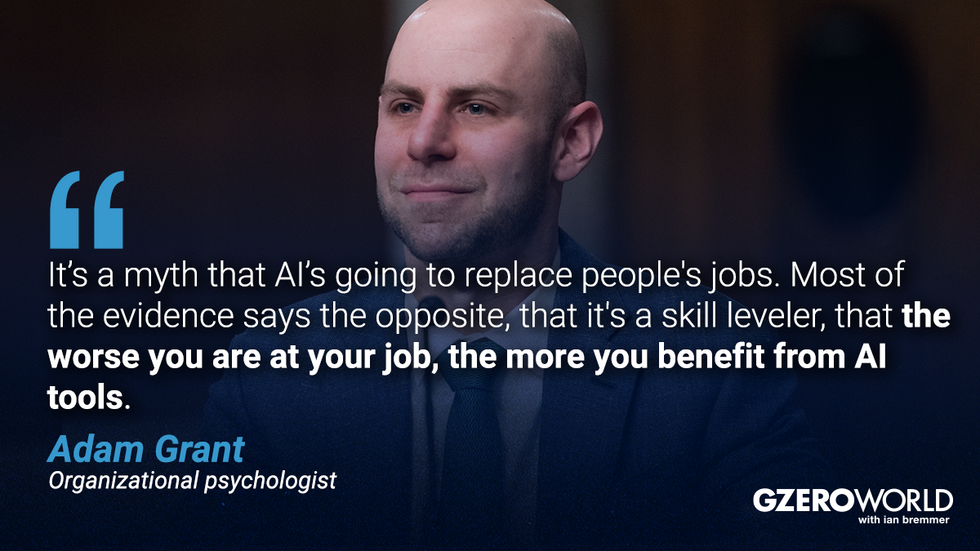
Aired on February 2, 2024
The AI revolution is coming… fast. But what does that mean for your job? Watch Ian Bremmer’s conversation with organizational psychologist Adam Grant.Yuval Noah Harari explains why the world isn't fair (but could be)
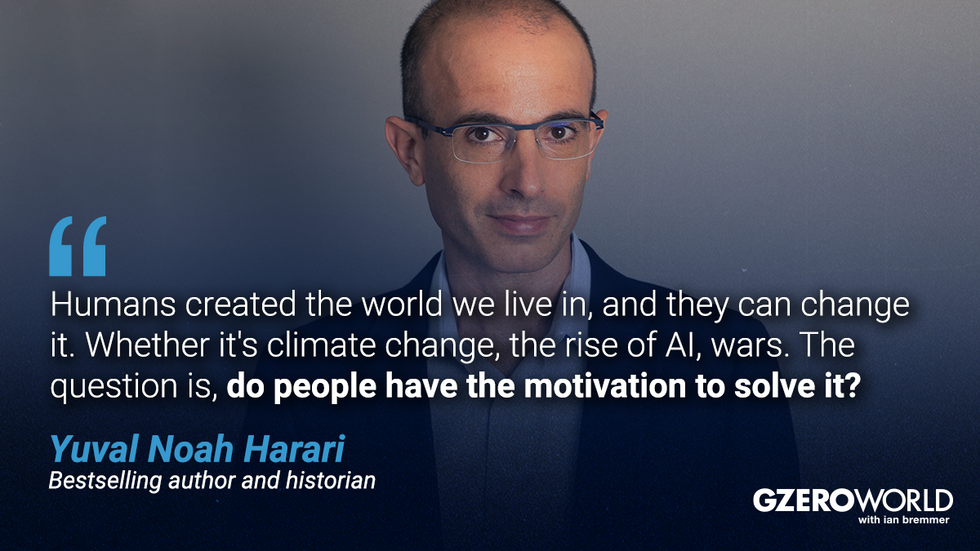
Aired on March 8, 2024
In a conversation filmed live at the historic 92nd Street Y in NYC, Yuval Noah Harari delves into the foundational role of storytelling in human civilization, the existential challenges posed by artificial intelligence, the geopolitical implications of the Ukraine war, and the most pressing questions of the Israeli-Palestinian conflict. Watch the full episode.Thomas L. Friedman on How the Israel-Gaza war could end - if Netanyahu wants it to
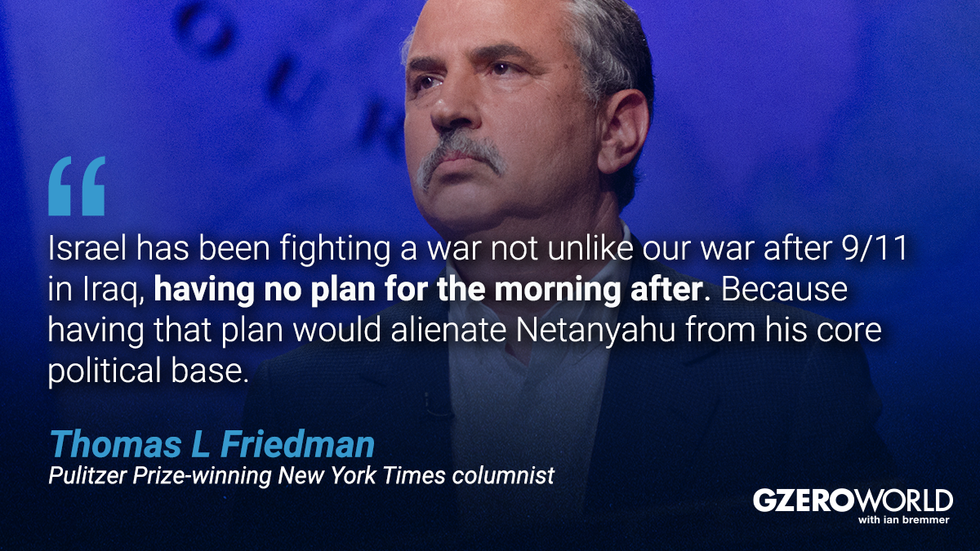
Aired on April 5, 2024
Pulitzer-prize-winning author and New York Times columnist Thomas L. Friedman games out a possible resolution to the war in Gaza and explains why both Israeli Prime Minister Netanyahu and Hamas are obstacles to peace. Watch the full episode.
Emily Bazelon on the major Supreme Court decisions of June 2024
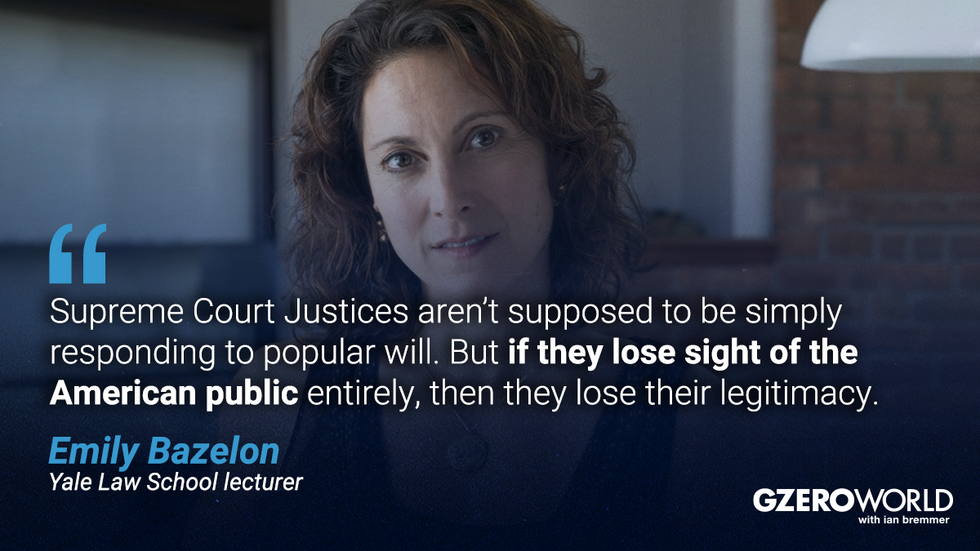
Aired on May 3, 2024
Yale legal scholar and New York Times Magazine staff writer Emily Bazelon unpacks some of the biggest cases that were on the docket this year and how the rulings will impact Americans. Watch the full episode.
Justice & peace in Gaza: The UN Palestinian ambassador's perspective with Riyad Mansour
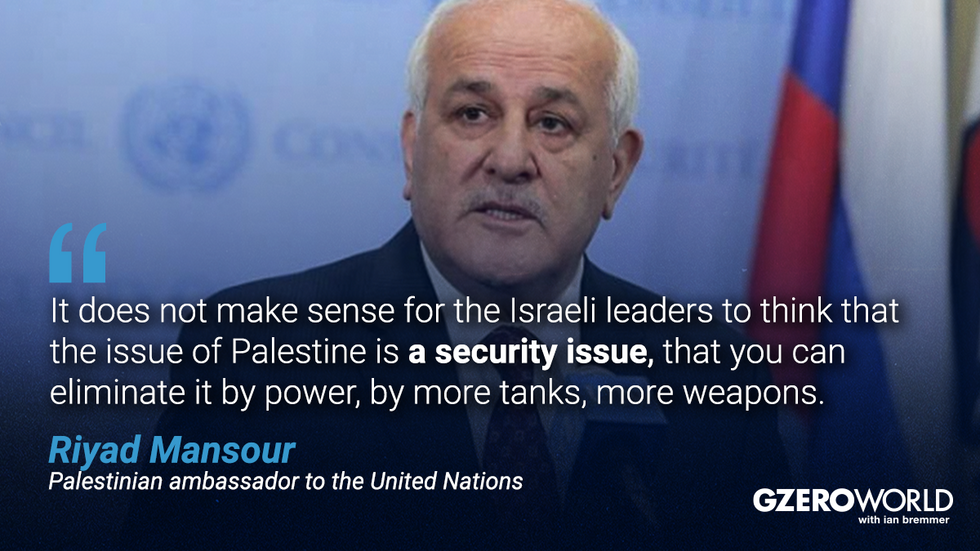
Aired on July 5, 2024
Ian Bremmer sits down with Palestinian Ambassador to the United Nations Riyad Mansour for a candid interview about his role in the UN, the war in Gaza, and how it might end. Watch the full episode.
An exclusive interview with Argentina's radical new president, Javier Milei
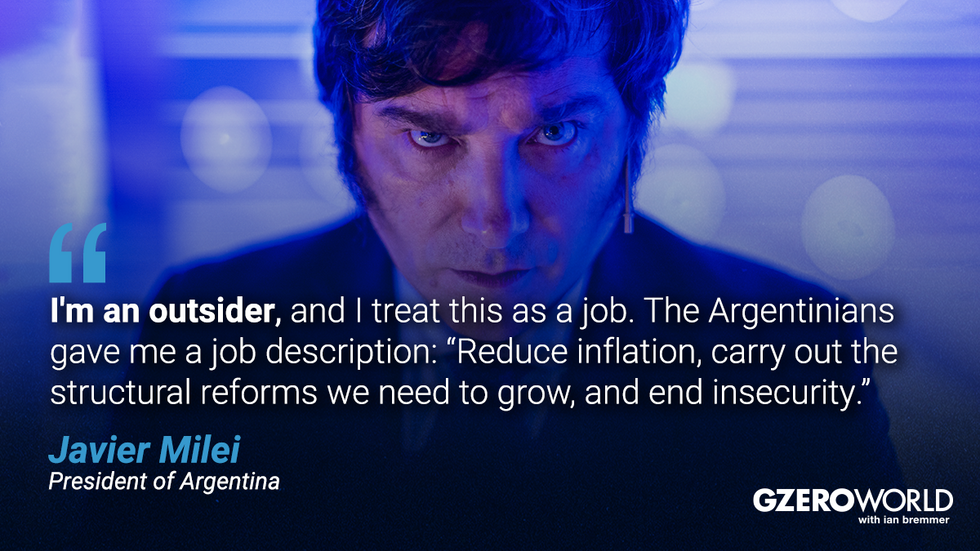
Aired on August 2, 2024
Argentine President Javier Milei defends his radical approach to saving Argentina’s struggling economy, his commitment to aligning with liberal democracies, and his pragmatic stance on international trade and alliances. Watch the full interview.
Why António Guterres believes the UN should lead on AI
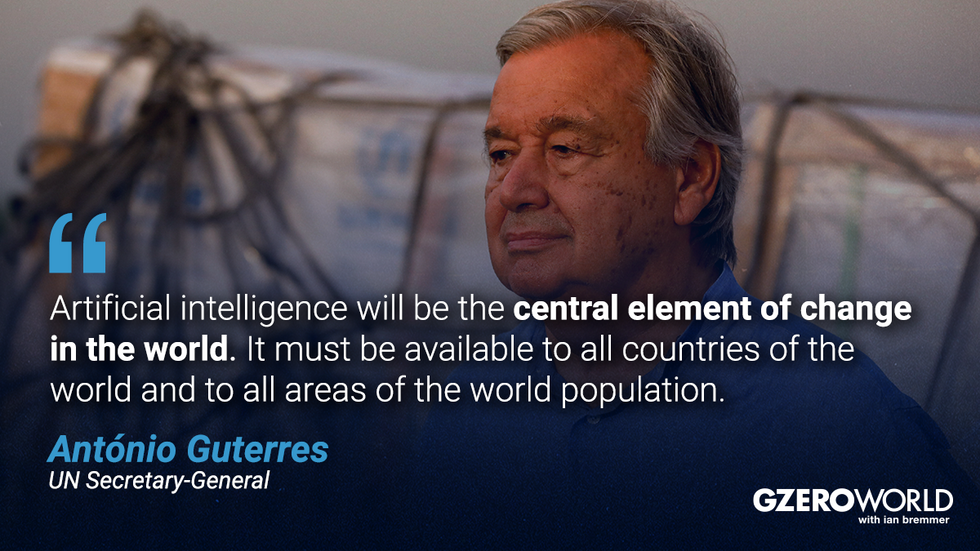
Aired on September 20, 2024
In an exclusive interview for GZERO World, United Nations Secretary-General António Guterres sat with Ian Bremmer on the sidelines of the UN General Assembly to discuss his vision for the future of the UN during his last term in office. Watch the full interview.
Iran's next move: Interview with VP Javad Zarif
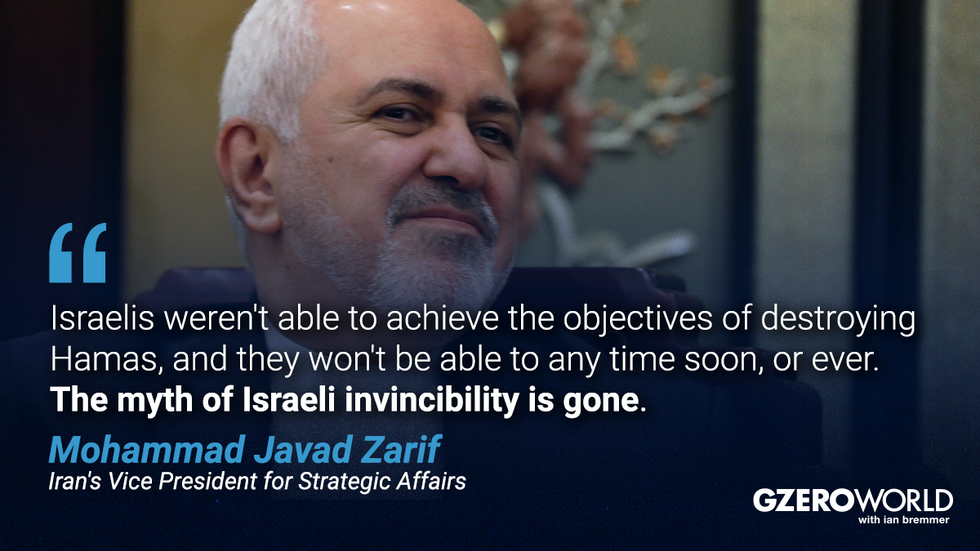
Aired on October 4, 2024
Ian Bremmer sits down with Iran's new Vice President for Strategic Affairs Mohammad Javad Zarif just days before the assassination of Hezbollah leader Hassan Nasrallah to discuss the escalating conflict in the Middle East and where Iran stands. Watch the full episode.
Roberta Metsola on whether Europe can become a global superpower
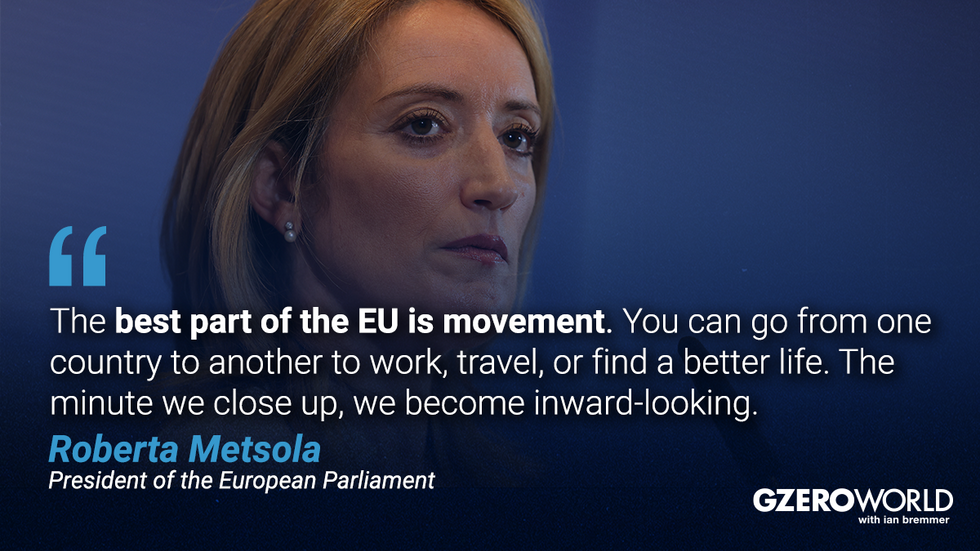
Aired on October 20, 2024
European Parliament President Roberta Metsola discusses Europe’s future amid an ongoing migrant crisis, the war in Ukraine, and an economic slowdown. Can the bloc’s 27 member states stay united? Watch the full episode.
Oren Cass on the case for Trump's tariffs
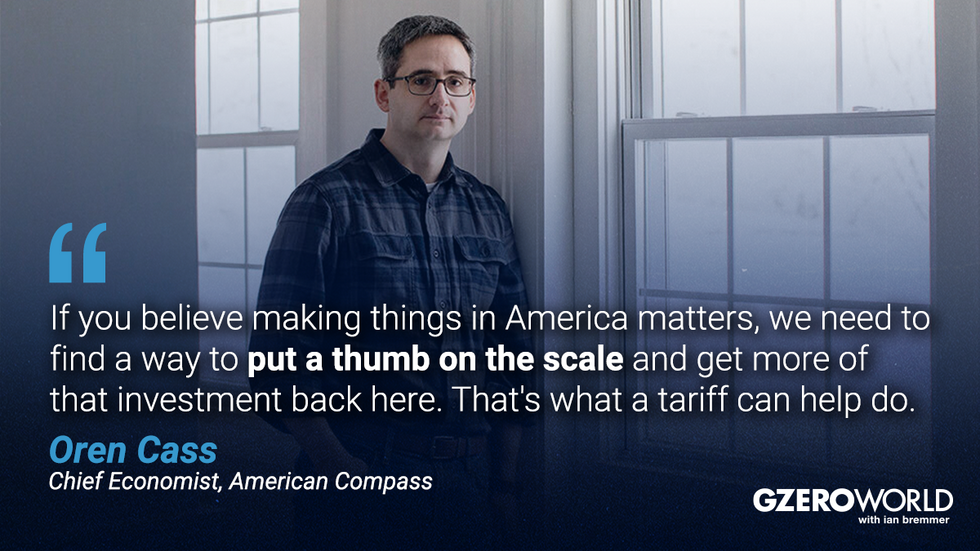
Aired on December 6, 2024
Trump has vowed to raise tariffs, slash business regulation, and deport millions of undocumented immigrants, policies he says will put Americans first. Oren Cass outlines what that will mean practically for workers and consumers. Watch the full episode.
Don’t miss an episode in 2025!
GZERO World airs nationwide on US public television (check local listings), and new digital episodes of GZERO World are released every Monday on YouTube.
Syria after Assad
The Assad family no longer rules Syria. How did a brutally repressive regime rule with an iron fist for five decades only to collapse in two weeks? And after 14 years of bloody civil war, why was now the moment that a frozen conflict exploded into the global spotlight? The cost Syrians have already paid is greater than any nation could reasonably be expected to bear. Since 2011, more than 500,000 Syrians have died, including 200,000 civilians, and nearly six million refugees flooded neighboring Arab States and some European nations, most notably Germany.
But there’s no guarantee that the suffering will end just because the Assad regime has. To help make sense of these shocking past few weeks and the potential power vacuum to come is Kim Ghattas, a contributing editor at the Financial Times and author of Black Wave. “There was a decrepitude that installed itself within the regime's ranks and just a general exhaustion, life was not getting better for those who stood by the regime. And so I think there was a feeling that it was time to abandon him.”
GZERO World with Ian Bremmer, the award-winning weekly global affairs series, airs nationwide on US public television stations (check local listings).
New digital episodes of GZERO World are released every Monday on YouTube. Don't miss an episode: subscribe to GZERO's YouTube channel and turn on notifications (🔔).
The case for Trump's tariffs
What will President-Elect Donald Trump’s election win mean for the US economy? After years of inflation and stagnating wage growth, millions of voters elected Trump off the back of his promise to usher in a “golden age of America.” Trump has vowed to raise tariffs, slash business regulation, and deport millions of undocumented immigrants, policies he says will put Americans first. But what will that mean practically for workers and consumers? On GZERO World, Ian Bremmer is joined by Oren Cass, the founder and chief economist of the conservative think tank American Compass, who thinks Trump’s tariff plan will be a step in the right direction. Many economists argue that Trump's tariff plans will raise consumer prices and spark a global trade war, but Cass argues they're a necessary correction that will incentivize domestic manufacturing, reduce the deficit, and counter China’s unfair trade practices.
“If you actually believe that making things in America matters, then we are going to have to find a way to put a thumb on the scale for getting more of that investment back here,” Cass explains, “And I think that's what a tariff can help do.”
GZERO World with Ian Bremmer, the award-winning weekly global affairs series, airs nationwide on US public television stations (check local listings).
New digital episodes of GZERO World are released every Monday on YouTube. Don't miss an episode: subscribe to GZERO's YouTube channel and turn on notifications (🔔).
More Episodes
Trump foreign policy in a MAGA, MAGA world
As Trump prepares to return to the White House, his foreign policy picks are already showing just how radically his presidency could reshape geopolitics. New York Times Correspondent David Sanger joins Ian Bremmer on GZERO World to discuss what a Trump 2.0 foreign policy could look like for some of today's key geopolitical flashpoints.
Why the world is facing a population crisis
On GZERO World, Ian Bremmer sits down with Jennifer Sciubba to explore a looming global crisis: population collapse. With fertility rates below replacement levels in two-thirds of the world, what does this mean for the future of work, healthcare, and retirement systems? In the US, Vice President-Elect JD Vance and Elon Musk are already sounding the alarm, the latter saying it's “a much bigger risk” to civilization than global warming. Can governments do anything to stop it?
Trump's America: How MAGA came out on top
Donald Trump’s historic return to office signals a powerful shift in American politics, raising questions about the future of democracy as both major parties grapple with deep divides and an increasingly anti-establishment electorate. Along with Vanderbilt historian Nicole Hemmer and Wall Street Journal correspondent Molly Ball, Ian Bremmer unpacks the wide range of implications of Trump’s decisive election win.
Top threats to US election security
As Election Day approaches, US cybersecurity chief Jen Easterly warns that while America’s voting systems are more secure than ever, the period between voting and certification remains vulnerable, with foreign adversaries poised to exploit any internal divisions during this critical time. Watch her interview with Ian Bremmer on GZERO World.








